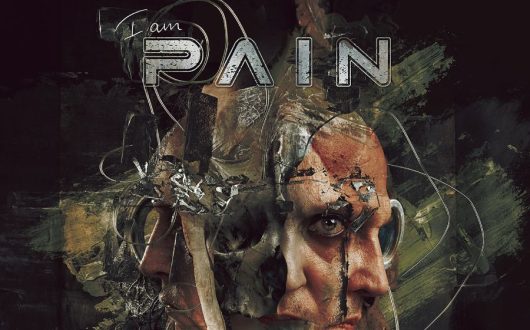Interview by Robert Cavuoto
Anchor & Braille, the side project of Anberlin vocalist Stephen Christian, will be releasing his fourth solo CD, Tension, on May 22nd via Tooth & Nail Records. This new studio release is inherently personal and a departure from the music he has come to be known for with Anberlin. Tension explores the more pop-driven side of his songwriting and was born out of a creative time during the recent Anberlin reunion in 2019.
I had the opportunity to speak with Stephen about the new release, his desire to seek the ultimate expression in his songs, and the importance of finding his own voice as a solo artist.

Robert Cavuoto: Can you share a little bit about the vision you had going into this CD and maybe how you wanted it to be different from your previous releases?
Stephen Christian: The vision of any album is to continually change things up. The first album was recorded in Lakeland, Florida, and I used a lot of friends who were musicians from that part of town. For the second album, I moved to Nashville and used a lot of great musicians from that area, and the third album was created in Nashville, but I used a different producer. This new album was an anomaly, as it was just me and producer Chad Carruthers. Every single album has been different from the sound to the style to the musicians to the producers. This one is different in the fact that I didn’t produce it where I live. I had such a deep connection with Chad as we have been writing together quite some time for other artists as well as Anchor & Braille. I have a scenario like a movie trailer in my head when I’m writing an album. My last album for Anchor & Braille was Songs for the Late Night Drive Home, and that was the theme which was playing in my head. For this one, I envisioned someone by themselves in their room just being silly and having a few carefree seconds while listening to these songs. Ironically, here we are in the midst of a pandemic where were people are forced inside. It’s strange where my headspace was at when I was writing the album and where we are now. The irony is not lost on me.
Robert Cavuoto: You are a prolific songwriter and always expend extreme efforts to seek the ultimate expression in a song. Do you know what drives that artistic work ethic?
Stephen Christian: There are many things, but at the deepest core level, I was raised a failure and believed I was one. I worked as hard as I possibly could to make sure that my life didn’t end up going that way. It started out that way because of family and different scenarios in my early life that never made me feel I was good enough. So that drove me to be an overachiever and workaholic who was looking to find my success and entrepreneurial spirit. It actually aided me in a lot of ways from my upbringing. My parents once apologized and we now have a healthy relationship. I told them that it made me who I am today. If I was born with a silver spoon in my mouth, I wonder how far I would have gotten? So, I’m appreciative of everything and where I came from as it got me where I am today. That’s at the core, but beyond that, I’m passionate about music. I love the creation and the business side. I love watching the cells of a song form and duplicate to create something beautiful. I love every component of the recording process. I think it is just ingrained in who I am, and I don’t believe that creativity will ever die. As long as someone will listen, I’ll always push out albums.
Robert Cavuoto: Songs are written in different ways and for different purposes based on your frame of mind. Do you do find yourself creating something adequate one day, then suddenly creating something very special the next?
Stephen Christian: I think you have to continue to create. I can remember there were songs that I thought were going to be hits. When we were working on the Anberlin album, New Surrender, I wrote a song called “New Surrender.” I called Universal Records and told them I had the single! I told them to put it in the books. Then the label and producer said, “That song sucks!” I was bummed as it never saw the light of day. We made the album, and I had to ironically surrender that song. There are times you create something you think is going to be profound, and someone else decides you can do better, or you can try harder. I remember a story my dad told me about his college roommate who would wake up at 5:00 am every day to write a 15-page science fiction short story, then crumpled it up and toss it out. It was all about practicing. I think the same can be said about songwriting as it takes work and repetition. The really great ones exist because so many bad ones are on the cutting room floor. They are there to inspire the great ones.
Robert Cavuoto: What song off this CD would say came to you like a gift from above?
Stephen Christian: There was one which was instantaneous. Chad and I were hanging out working to determine which songs would go on the album. Chad showed me an old demo that he recorded a long time ago. When I heard the beginning of it, I was like, “Oh my God!” I went downstairs with some headphones, and 15 minutes later came back up excited. I had written the entire song, “Tethered.” It was so effortless. Because we wrote in that short amount of time, I asked Chad if he had any more demos like that. It’s why I love to do these Anchor & Braille albums because they are done in a carefree style. We fine-tuned it in the months of recording, but like you said, it was a gift from above.
Robert Cavuoto: Tell me about the importance of finding your own voice as a solo artist?
Stephen Christian: I now have the utmost liberty to do whatever I want, whenever I want. There are positives and negatives to everything. The negative is there are five other guys who are providing input in the creation of a song, so there are many cooks in the kitchen. Whatever you think the song should sound like has to be filtered through five different band members, a producer, and a manger. However, I love the checks and balances as not a lot of garbage ends up on an Anberlin album because of all those filters. That the positive. I’m a much better musician in my head than I am with my hands [laughing]. In my head, I hear where the guitar comes in, where the beat kicks in and stops, and so on. It’s fun to dream up a song and then work with the producer to help create it so sonically, what you hear in your head is what the listener hears.
Robert Cavuoto: Are you more comfortable as a songwriter now than when you were in Anberlin?
Stephen Christian: Oh yeah! I wish I knew then what I know now about songwriting and song creation. It would have been fun to take some of those ideas and concepts that I don’t feel I like and gone all the way with them. I really regret the song “Alexithymia” off of the album Cities. I know it means a lot to people, but that chorus is horrible. It has a great line in, but it could have been so great. I wish I could go back and tell myself that the repetition was going to burn the listener out because they can only listen to it a few times. I should have added more variety, and I didn’t learn those lessons until late in the process of New Surrender. I feel that I’m a well rounded and grounded songwriter now than I ever was in my career.

Robert Cavuoto: I’m intrigued by the CD title, the artwork, and the meaning of it all?
Stephen Christian: Ironically, the album is called Tension, and the first single is called “Dangerous.” I was being a little tongue in cheek about having some rebellious tension with “Dangerous,” and the first note you hear is a whimsical element and a falsetto chorus. There is not a lot that is dangerous about that song. A friend said, “It’s always great to live in healthy tension,” what he was trying to say was that going to any extreme in one area of your life is never positive. For example, if you’re a workaholic, you are probably missing out on some core family time. If you spend all your time at home, then you run into tension with your wife about getting a job; everything in a healthy balance. Then I wrote the song “Eventful Horizon,” which is life and balance in song form. It starts out with a driving minor key and feels like it’s weighing you down. Then the chorus goes into a major key, and everything lifts, making you feel free. Then it drags you back down again with a minor key. The song has such great healthy tension and such love in the universe. That is why we call the album Tension.
As far as the artwork, I have worked with the same artist on every Anchor & Braille album, Don Clark. He is a terrific graphic designer and did the artwork on Foo Fighters Grammy award-winning albums a few years back. He was conceptualizing the tension between Sistine Chapel and Michaelangelo’s painting with the tension between the two realms. I wanted it within the confines of the name of the band Anchor & Braille with a nautical theme. It’s like God within the nautical theme. He added the distressed scuba flag under it all, which adds to the tension.
https://www.facebook.com/anchorandbraille/





